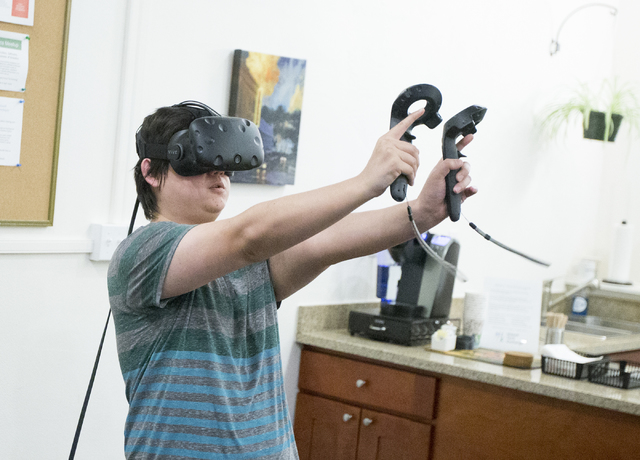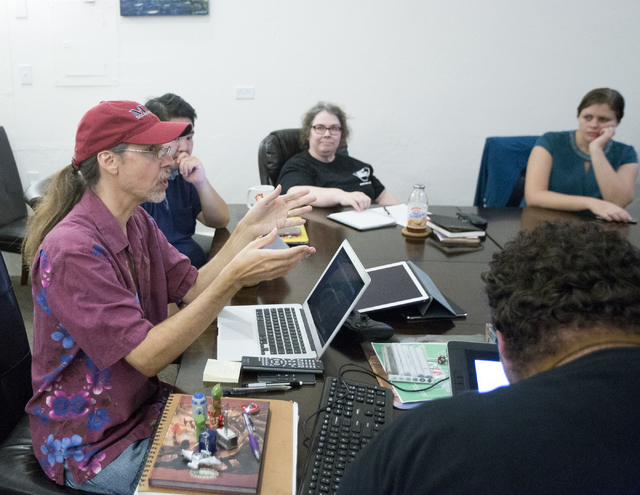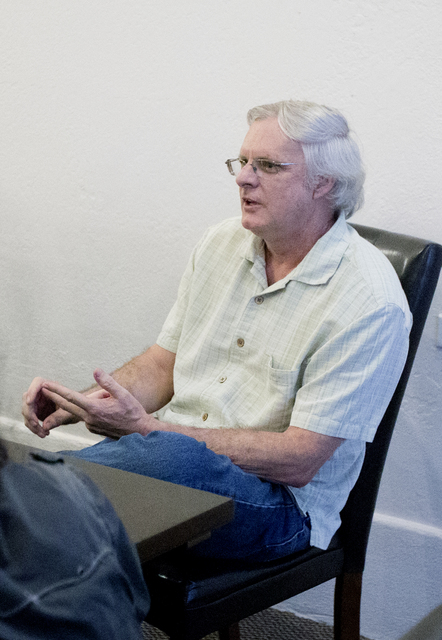Vahid Ajimine showed his dice-rolling game on a giant screen, describing what he likes and what he wants to improve.
While techies seated at a boardroom table asked Ajimine questions and made suggestions, Albert Guo stood behind them with virtual-reality goggles on his head, tossing his arms in the air to “test play” the game he developed. Nearby, a screen showed what he was seeing in the goggles.
Ajimine and Guo are part of the Hawaii Island Game Developer Group.
Some members earn a reasonable living uploading their games online. Some would like that to happen but haven’t reached that level yet. Others are hobbyists who like the extra money but enjoy the process of game development for its own merits — and any bit of money earned is icing on the cake.
Group members, mostly from Hilo, bounce their game ideas off each other, making coding additions to ease user-friendliness. A group member suggested, for example, that Ajimine add a “back” button in case a player wants to show his game’s introduction to a late-arriving friend.
When the group meets, said Jeremy Wilson, “sometimes people will have a game that’s kind of ready for ‘play-testing.’” Group members test it out, checking for ease-of-understanding, missing design pieces and potential coding additions or alterations.
Wilson, like most in the group — at least those who are not retirees — has a day job as a paraprofessional.
“I use games in what I do to teach the kids with special needs,” he said. For example, a game’s characters crowding near a player’s character can help the player become more comfortable with crowds in real life, Wilson said.
He designs board games and card games as a hobby but primarily serves as a game illustrator.
“I do illustration for lots of games,” he said.
Don Kosak, general manager of the Tech Exchange, where the group meets, said game developers can come from different specialties. Musicians create game sounds, game illustrators make the images in a game and game developers write the actual game code. Getting together in one room helps ideas flow.
“A lot of times you’ll get really useful feedback,” Kosak said.
Wilson recently created an entire universe.
“On this planet, robots run the world. They’re very patriotic,” Wilson said. The game’s characters hire people to work for them instead of working for a living. And that’s where the fun begins.
Wilson is working on a game system that provides players with what he calls “tangible energy” — a jar of which can be used for immediate power during a game. But the player needs to keep getting more tangible energy jars because, once a jar is empty, there’s no more power in it. That affects how players perform.
“It really causes them to do resource management,” Wilson said.
Ajimine is also a paraprofessional. He focuses after hours on developing game apps, whereas Guo concentrates on writing code for VR games.
Kosak tried the new virtual-reality game created by Guo and quickly learned how to hold his virtual hands in the air to gather balls of energy and throw them at the game’s creatures — replete with glowing yellow eyes. When he finished the game test, Kosak removed the goggles and said “the environment felt real. I liked the stonework. It almost felt like I was on another planet.”
His headset blocked out the sound of other game developers in the room.
“It feels like I have emerged out of the cave into the real world after fighting,” he said.
Kosak said groups that meet at the Hawaii Tech Exchange include app developers, website designers, robotics designers, and writers.
Writer Larry Czerwonka said he has set out to “come up with a brand new form of entertainment that doesn’t exist.” His idea is a book that, when read electronically, will change depending upon the reader’s location.
For example, the book’s characters could change in response to current weather. If the reader sits on a bench in warm, picturesque Hawaii, a book character might decide to come forward with needed information. But if the reader takes the reading device to Siberia, the same happy character from the day before might have the characteristic of grumpiness during cold weather and fail to hand over the information.
Kosak said the gaming group, in particular, has about 130 to 140 members total, although each meeting is unique in terms of how many people attend.
Designing has many potential rewards, Kosak said.
But there are about 700 new apps uploaded to iTunes every day, he said. So sorting through all the clutter, especially for game designers, is important.
The Hawaii Island Game Developer Group typically meets the third Thursday of the month from 6-8 p.m. at the Hawaii Tech Exchange, located at 259 Haili St. in Hilo. For more information, visit www.facebook.com/hitxhilo/ or https://hitx.co.
Email Jeff Hansel at jhansel@hawaiitribune-herald.com.











